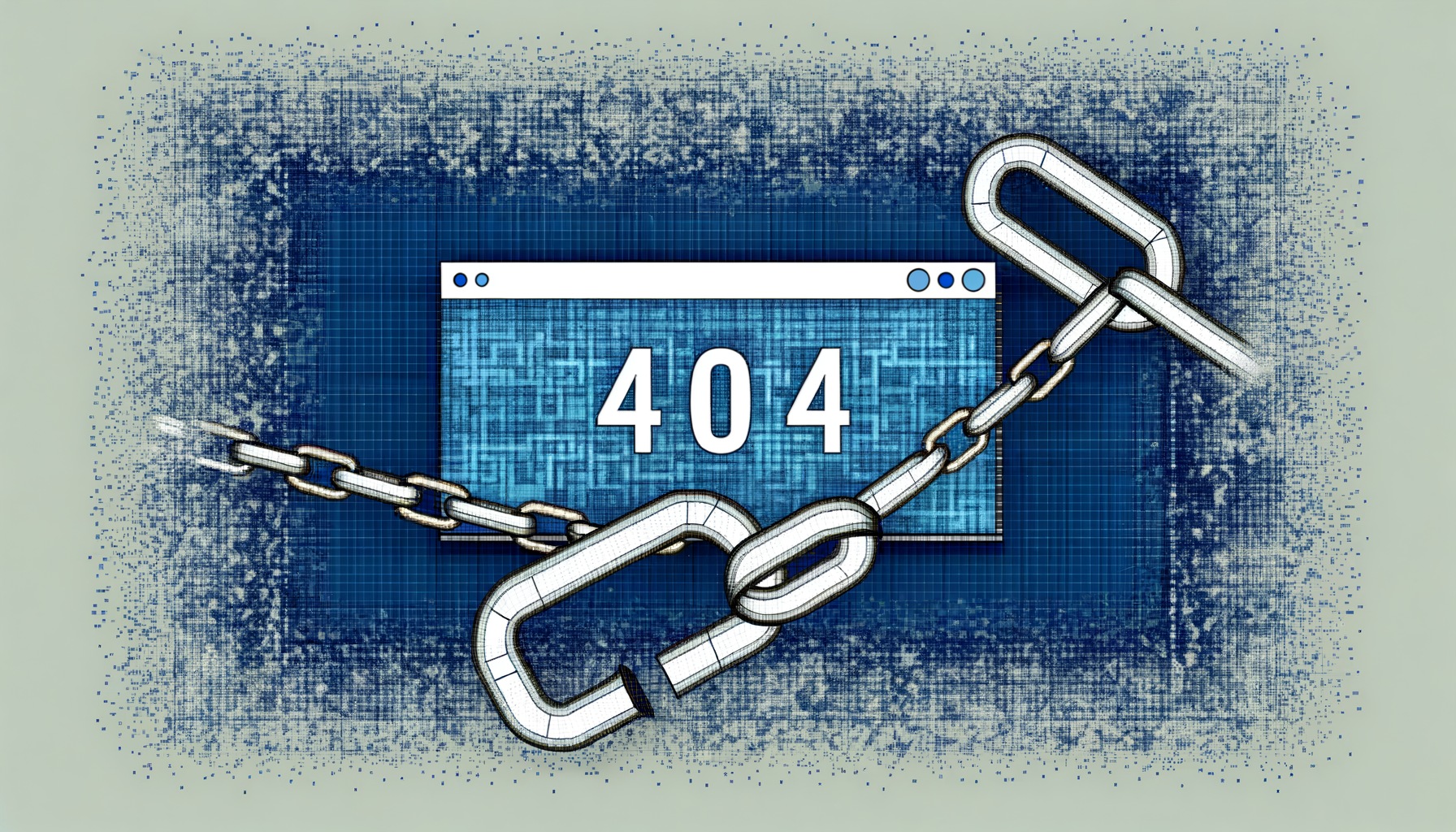
404 errors, simply put, are designed to alert both users and search engines that the webpage they are trying to reach cannot be found on the server. While they don’t directly affect a website’s ranking on search engines like Google, they can indirectly impact SEO performance by hurting user experience, increasing bounce rate, and potentially leading to a decrease in site authority if the issue persists over time. Let’s take a closer look at the SEO implications of 404 errors and how managing them well can indeed protect and even enhance your site’s search engine performance.
Understanding 404 Errors and Their Impact on SEO
404 errors often occur when a page is deleted or moved without proper redirection. While 404s are normal parts of the web environment, excessive 404 errors can signal a problem with a website’s structure or maintenance. It’s crucial to understand that search engines crawl the web by following links. When a link leads to a 404 error, the so-called crawl budget, the time or number of pages a search engine allocates to a website, can be wasted. This, in turn, can lead to a slower indexing of your content, potentially affecting the freshness score and the visibility of your website in search results.
The User Experience Factor
From a user’s perspective, encountering a 404 error can be a frustrating experience, leading to a poor perception of your site’s quality. If users are met with a dead end, they are more likely to bounce back to the search results and look for another source. This user behavior sends negative signals to search engines, indicating that the website may not have the desired content or is not user-friendly, which might indirectly affect the site’s rankings.
When considering user experience, we must note that not all 404 errors are bad. In cases where content has become obsolete, it may be better to let those pages return a 404 response. But in general, a strategy should be in place to manage and reduce unnecessary 404 errors.
Link Equity and 404 Errors
Link equity, also known as link juice, is the value passed from one page to another via links. When a page that has accumulated link equity is suddenly gone without proper redirection, the equity that could be passed through its links is effectively lost. This is particularly detrimental if the page with the 404 error has backlinks from other reputable sites. Not only are potential visitors from these links met with a poor experience, but the ranking benefits that could be gained from these links are not utilized.
Best Practices for Managing 404 Errors
To minimize the negative SEO impacts of 404 errors, it is important to continually monitor the health of your website and implement the best practices for error management.
Regular Site Audits
Regular site audits can help you detect 404 errors in a timely fashion. There are numerous tools available, such as Google Search Console, which can assist you in identifying crawl errors. By conducting regular checks, you can react quickly to fix any broken links or set up the necessary redirects.
Implementing 301 Redirects
For moved or renamed content, 301 redirects are essential. A 301 redirect tells search engines and users that a page has permanently moved to a new location, passing most of the link equity to the new page. This ensures that even if users or search engines encounter an old link, they will be seamlessly guided to the right content.
Customizing the 404 Page
Instead of allowing a default server error message to greet your visitors, customize your 404 page. A user-friendly 404 page can maintain brand consistency, offer navigation options back to your main site, or direct users to other relevant content. Providing a search bar or a sitemap can keep users engaged rather than driving them away.
Monitoring External Links
Keep an eye on the most valuable backlinks to your site. If they lead to a page that has been removed, reach out to the webmaster to update the link or implement a redirect as necessary. Maintaining these connections preserves the link equity and the beneficial SEO effects it has.
Training Your Team
Sometimes, 404 errors occur due to human error—incorrectly typing a URL in a link or deleting a page that is still in use. Training your team on the importance of checking and double-checking their work when updating or editing the website can reduce the occurrence of such errors.
Advanced Strategies to Combat 404 Errors
For webmasters aiming to go beyond the basics, the following strategies can significantly reduce the impact of 404 errors on SEO.
Utilizing Soft 404 Errors
Google differentiates between hard 404 errors (the definitive response that a page cannot be found) and soft 404s (which look like a 404 page but return a 200 status code, indicating that the page exists). Be cautious with soft 404s, as they can confuse search engines and potentially give a false impression that non-existent content exists on your site. Ensure that true 404s are returning the correct status code.
Creating Helpful Redirect Rules
Where appropriate, rather than redirecting all 404s to your homepage, create redirect rules that send users to the next most relevant page. If you have a site with distinct categories or products, setting up rules that redirect to the appropriate category or a related product can significantly enhance user experience.
Link Consolidation
Over time, websites may accumulate multiple pages discussing similar topics. By consolidating such pages into more comprehensive resources and then redirecting the old URLs to the new, more authoritative ones, you maintain link equity and consolidate ranking power, which is favorable for SEO.
Finishing Thoughts
404 errors are an inevitable aspect of managing websites, but they should never be neglected. While search engines understand that 404 errors occur, it is how these errors are managed that can make a difference in SEO. By monitoring your website, addressing errors promptly, and implementing user-friendly solutions, you can ensure that 404s do not harm your site’s search engine performance, but instead offer opportunities for optimization and improvement. Regular site audits, skilled use of 301 redirects, thoughtful link preservation, and team awareness are integral components of an SEO-friendly website maintenance strategy. With careful attention to these factors, 404 errors can be transformed from a potential liability into a successfully managed aspect of your site’s ongoing development.“`html
Frequently Asked Questions
What is a 404 error?
A 404 error is an HTTP status code that means the page you were trying to reach on a website couldn’t be found on the server. It is a client-side error, which means the page has been removed or moved, and the URL was not changed accordingly, or that you typed in the URL incorrectly.
Do 404 errors hurt my site’s SEO ranking?
404 errors do not directly affect your site’s SEO rankings. However, if there are numerous 404 errors on your site, it could impact user experience, which can indirectly affect rankings. Search engines value user experience, and having many 404 errors can lead to reduced dwell time and increased bounce rate.
Should I be worried about 404 errors?
While 404 errors are normal and can occur occasionally on any site, it’s important to fix them or manage them correctly. Frequent 404 errors can lead to poor user experience, which may indirectly affect your site’s performance in terms of visitor retention and engagement.
How can I find 404 errors on my website?
You can find 404 errors by using various tools such as Google Search Console, which reports crawl errors including 404s. Additionally, you can use desktop and online crawling tools that can scan your website for broken links that result in 404 errors.
How do I fix 404 errors?
To fix 404 errors, you can redirect the broken URL to a valid one using a 301 redirect if the original page is permanently moved or deleted. If the page exists but has a different URL than what is being requested, updating the broken link to point to the correct URL will resolve the error. If the content is gone and there’s no relevant page to redirect to, delivering a 404 page with options to navigate back to main parts of your site is best practice.
Can custom 404 pages help with SEO?
Yes, a custom 404 page can help maintain a good user experience by guiding visitors back to other parts of your website, which may reduce bounce rate and encourage them to stay on your site longer. Although it doesn’t directly impact SEO rankings, it can contribute to better user metrics and overall site performance.
How do search engines handle 404 errors?
Search engines understand that 404 errors can happen and they generally do not penalize sites for these errors. However, if a search engine crawls your site and encounters too many 404 errors, it may perceive this as a sign of a poorly maintained site, which could potentially harm your rankings over time.
“`






